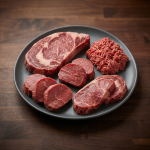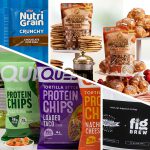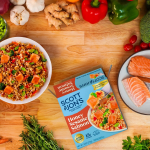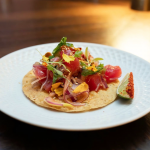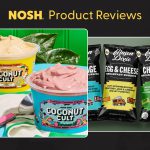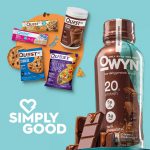With New CEO, The Real Coconut Plans for Growth Beyond Coconut
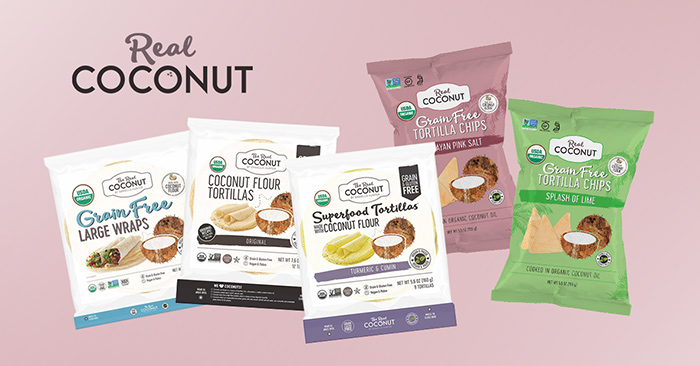
While coconut flour-based tortilla and chip maker The Real Coconut has primarily focused on its namesake ingredient since its launch in 2016, the brand is now poised to expand its horizons to create a platform of plant-based gluten and dairy free products. To do this, the brand brought on a new CEO, former General Mills executive Camille Gibson, who has spent much of 2020 charting growth plans set to be realized this year.
Despite joining the company just after the COVID-19 pandemic hit, Gibson got to work fast, “laying out [a] roadmap” that she said will help the brand reach its goal of $25 million in revenue by 2023, which includes new channels and geographies and new product categories. The brand grew its revenue by 32% in 2020, she said, and has also made major distribution gains. In the fourth quarter of 2020, it launched its Grain Free Tortilla Chips at 1,000 Publix locations, and its Grain Free Large Wraps in over 300 Sprouts Farmers Market locations, bringing its door count to 5,000 stores across the U.S. and Canada. The brand is also testing its tortillas in foodservice through a partnership with Los Angeles-based Mexican restaurant chain Tocaya, and has done rotations in multiple Costco regions.
Gibson said the brand aims to further grow in the club and foodservice channels in 2021.
Real Coconut is also currently working on a rebrand, slated to launch in June, partnering with Minneapolis-based agency Zeus Jones that worked on several of the General Mills brands. While Gibson said the Real Coconut name has “served the products so far in the line,” a new brand name will allow the brand to expand its reach beyond coconut to other ingredients like plantain and cassava. It’s a move that is important in order to allow the company to reach more shoppers and not feel constrained by its current name.
“Our ambition has always been to create plant-based foods with that idea of better for you and better for the world,” she said. “We wanted to develop a brand that matched the breadth of our future products and ingredients, like plantain and cassava. We need a brand that captures the depth and thoughtfulness of our mandate.”
Real Coconut is currently in the process of raising a Series A funding round which Gibson said will fuel the brand’s growth over the next three years.
Gibson retired from General Mills in 2015 after nearly 15 years with the company, serving as VP of marketing and business unit director for brands like Yoplait, Nature Valley and Fiber One, before leading marketing cereal brands Cheerios, Wheaties and Cascadian Farms. While Gibson learned much from her time at the global company, she was ready for the challenge of working with an emerging brand, she said.
“I wanted to figure out once I had stopped doing the 100 miles an hour job, what did I miss? I wanted to get back into working with a brand or a company that really fit with some leading edge consumer trends, as well as had a purpose and a philosophy that I really aligned with,” she said.
One of her last projects at General Mills entailed moving the Cheerios brand to a gluten-free supply chain, which she said was a “huge endeavor.” It was this process that first truly exposed her to the importance and intricacies of special diets, a point of view that ultimately influenced her decision to join Real Coconut.
“I really got to know deeply about people that had food issues, whether it was celiac or autoimmune, and I realized that there are products out there that could really deliver against a healthy lifestyle that these folks were looking for,” she said. “So [Real Coconut] was just a great match.”
She originally joined the company’s board in 2019 to familiarize herself with the brand and co-founders Daniella Hunter and Charlie Stuart Gay, who previously led the brand, before taking on the role of CEO in April of last year, a move the company only formally announced this year.
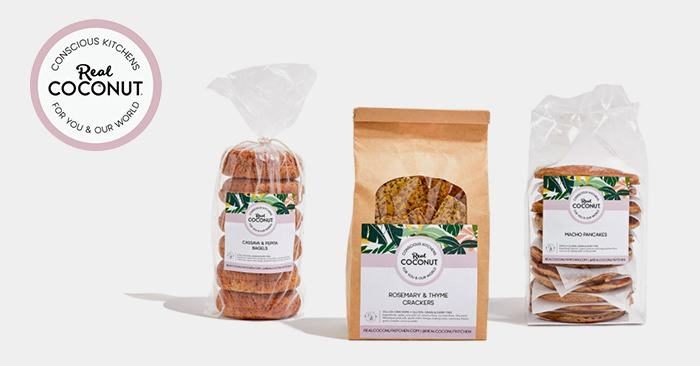
As the brand eyes expansion into other ingredients and categories, it will draw from insights Hunter has gathered as executive chef of the Real Coconut Kitchen, a sister restaurant business that inspired the CPG line. After opening her first eatery in Tulum, Mexico in 2015, Hunter opened a second location in Los Angeles last October, offering nearly 80 food and drink products made from coconut as well as plantain and cassava, including bakery items, coconut cheeses and yogurts, desserts and meals like salads and burritos. In November, Real Coconut Kitchen launched an online marketplace and local delivery in response to the dining shut-down in the city, offering its products as well as more typical grocery items. Gibson said the brand looks closely at what is resonating with consumers and selling well at the eatery and considers feedback from these consumers when planning out its innovation pipeline.
Several categories have seen success at the eatery and may be incorporated into the brand, including frozen meals (the eatery sells meals like enchilada, sliders and veggie burgers), savory crackers, and confections like plant-based brownies. Gibson said new products from the Real Coconut will launch later this year, and the brand aims to have one or two new category launches per year going forward. In addition to new category launches, the brand is also developing an ambient tortilla that will allow the brand to expand its placement beyond the refrigerated section into the deli section of the store to reach more consumers.
Despite the many changes coming to the brand this year, Gibson said it will remain focused on launching products that promote digestive health and offer choices for consumers whose food options have been limited due to special diets.
“We’re trying to look at what are some of the categories that don’t deliver the types of benefits that we have, that we know a core group of consumers are looking for but don’t necessarily get to partake in?” she said. “We think there’s some white space for us in a number of those categories.”

